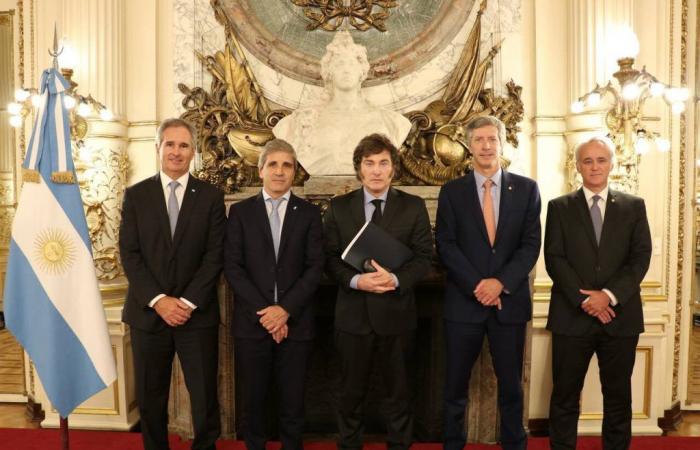The Argentine president, Javier Milei, speaks of an “economic miracle”, which allows the country to have, for the first time since 2008, a financial surplus. The libertarian, who arrived at Casa Rosada in December, promised to reduce the deficit and is delivering. The question is to know at what price – including the loss of income for pensioners, the total cut in public works and the end of energy subsidies, for example – and whether it will last.
“I understand that the situation we are experiencing is difficult. We’re already halfway there. This time the effort will be worth it”, said Milei, confidently, during his 16-minute television statement, which aired during prime time on Monday. “Against the predictions of the majority of political leaders, professional economists, television and tribune scoundrels, specialized journalists and a large part of the Argentine establishment, I want to announce that the national public sector recorded a financial surplus of more than 275 billion pesos. It is 0.2% of GDP during the first quarter of the year”, he revealed, saying that it is an unprecedented scenario since 2008.
The president, alongside the Minister of Economy, Luis Caputo, and the governor of the Central Bank, Santiago Bausili, recalled that “zero deficit is not just a marketing slogan” for his Government, but a “commandment”. And that this first surplus “is nothing more than the starting point to end the inflationary hell” that he inherited from the previous executive.
Milei attributed himself to “a world-class achievement” that proves that he “was right” in wanting to use the “chainsaw” to face the crisis that left “60% of the population in poverty”. Official data points to 48%, with some reading the president’s number expecting the situation to get worse.
A surplus arises when the State spends less money than it raises over a certain period of time. It is the opposite of the deficit, which Milei considers “the cause of all evil in Argentina”, the result of an “obsession” on the part of politicians to “spend what we don’t have”. The result, she recalled, once the sources of debt and tax increases were exhausted, was to issue more currency-and thus increase inflation. This has been falling, having been 11% in March, ten points less than in January, when it was 20.6%. It is still high, around 70% in the annual comparison, but it is falling faster than the International Monetary Fund itself had predicted.
Milei’s positive numbers come at the expense of public investment, with a cut in public works and the transfer of federal funds to Argentine provinces (around 62% compared to the same period last year). On the other hand, there was also a reduction in the real value of pensions due to inflation, as well as salaries and social plans, and several subsidies were also removed (67% less in energy subsidies or 32% of the university budget).
The General Confederation of Labor (CGT), an Argentine union, denounced the “liquidation of pensioners’ income”, with a drop of 40% in the space of a year. Pensions (except for the lowest ones to prevent them from falling below the poverty level) only rose 27%, well below the inflation rate.
The CGT also spoke about disinvestment in public universities, something that took thousands to the streets yesterday. As the budget for universities is not updated, there are some “that will not be able to operate in the second semester”, they claim. Milei’s problem with public universities goes further, accusing them of “political indoctrination”, with critics denouncing attempts to “show universities as centers of corruption”.
The question is whether Milei will be able to maintain the positive results. Last week, in a speech to businesspeople in Bariloche, the president left the challenge: “Boys, at some point you are going to have to have courage and invest”. Argentina celebrates the drop in country risk to almost half of what it was in November, an indicator of the increased degree of market confidence, as well as the replenishment of the Central Bank’s reserves. But there are problems, because with the increase in costs and the drop in sales, there are companies that are laying off employees and investing is not in their plans.
Regarding whether the surplus will last, the Argentine newspaper La Nación wrote yesterday that optimists believe so, remembering however that there are also those who argue that it is “unsustainable” for the functioning of the State to “cut everything, close the box and sit back on top”. And the question is how long Milei will count on popular support (50% already give her a negative rating in the polls).
Meanwhile, activists fighting for the defense of Human Rights, including 1980 Nobel Peace Prize winner Adolfo Pérez Esquivel, presented a petition to the Argentine Congress asking for Milei’s “political trial” for “poor performance of his duties and possible crimes”. They accuse the president of “economic genocide” that affects more and more Argentines.






